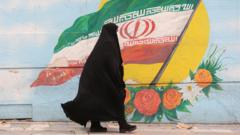Toomaj Salehi, a 34-year-old Iranian rapper, has been released from prison following the overturning of his death sentence, which had stemmed from his vocal support of anti-government protests. His two-year imprisonment underscored significant issues regarding freedom of expression and the government’s crackdown on dissent, particularly following the protests ignited by Mahsa Amini’s tragic death in custody.
Iranian Rapper Toomaj Salehi Released After Overturned Death Sentence

Iranian Rapper Toomaj Salehi Released After Overturned Death Sentence
Toomaj Salehi, the Iranian rapper imprisoned for supporting anti-government protests, is released from prison after an overturned death sentence, highlighting the struggles of dissent in Iran.
Salehi was initially arrested in October 2022 amid widespread demonstrations against the Iranian regime. His music often criticized the government's actions, which led to a ban on his performances even before his imprisonment. The death sentence, originally handed down in April 2024 for "corruption on earth," was overturned in June. Salehi was then sentenced to one year for propaganda against the state, which he ostensibly served before his release.
During his incarceration, he faced additional charges for sharing videos about his alleged torture by intelligence agents and other accusations like spreading disinformation and inciting public disorder. While out on bail temporarily, Salehi was re-arrested for these actions, reflecting the harsh realities of Iran's legal and political climate.
His release comes as protests rage on in Iran, sparked by Amini's death while in police custody for alleged hijab violations. With hundreds of lives lost and thousands detained since the protests began, Salehi's case has drawn international focus, drawing attention to the regime's severe responses to dissent. Influential organizations like Index on Censorship have advocated for his freedom, insisting that he should have never been imprisoned at all.
As Salehi steps back into the spotlight, his story continues to symbolize the broader struggle for individual rights and freedoms in Iran, raising important questions about the state of human rights under the current regime and the resilience of civil society amidst persistent crackdowns.
During his incarceration, he faced additional charges for sharing videos about his alleged torture by intelligence agents and other accusations like spreading disinformation and inciting public disorder. While out on bail temporarily, Salehi was re-arrested for these actions, reflecting the harsh realities of Iran's legal and political climate.
His release comes as protests rage on in Iran, sparked by Amini's death while in police custody for alleged hijab violations. With hundreds of lives lost and thousands detained since the protests began, Salehi's case has drawn international focus, drawing attention to the regime's severe responses to dissent. Influential organizations like Index on Censorship have advocated for his freedom, insisting that he should have never been imprisoned at all.
As Salehi steps back into the spotlight, his story continues to symbolize the broader struggle for individual rights and freedoms in Iran, raising important questions about the state of human rights under the current regime and the resilience of civil society amidst persistent crackdowns.





















